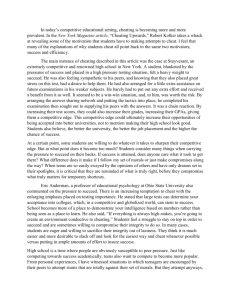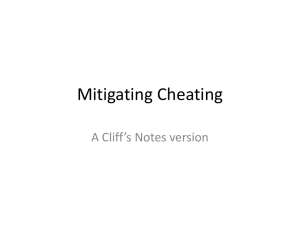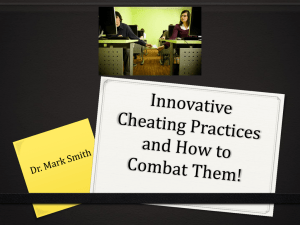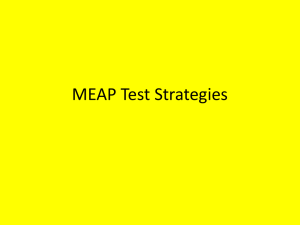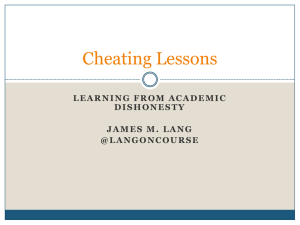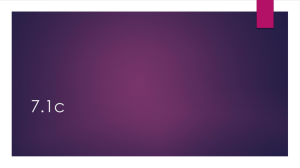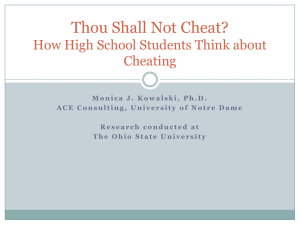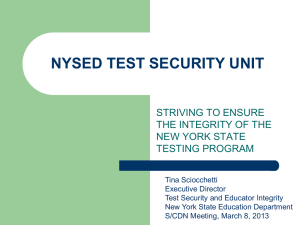Cheating
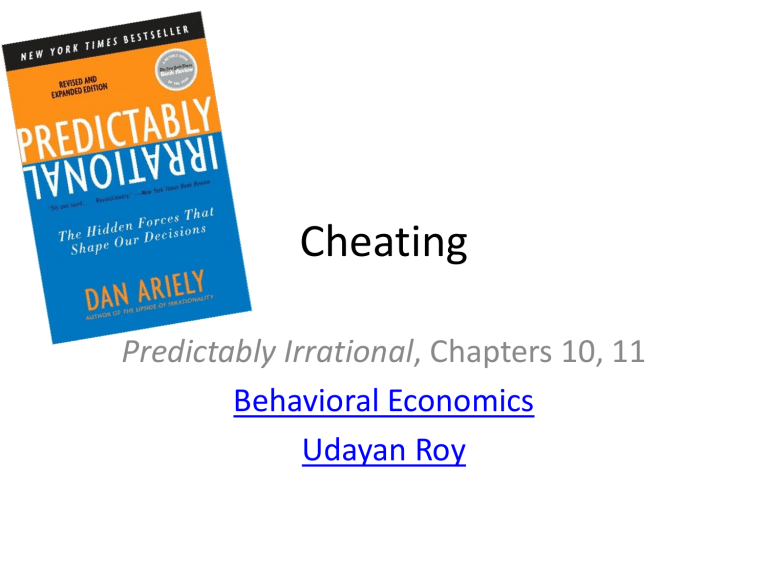
Cheating
Predictably Irrational, Chapters 10, 11
Behavioral Economics
Udayan Roy
An experiment on Harvard Business
School students
• Students were given a 50-question, multiple-choice quiz (on Jeopardy!-type trivia).
• They would take the quiz, then transfer the answers from the workbook to a
Scantron sheet.
• The students received $0.10 for each correct answer.
• The results were as follows:
• Students show answers on Scantron and give workbooks and Scantrons to proctor
(control group) : 32.6
/50
• Correct answers to the quiz pre-marked on the Scantron, students give both workbook and Scantron to proctor: 36.2
/50 (cheating = 3.6 questions)
• Correct answers to the quiz pre-marked on the Scantron, students shred their workbook and give Scantron to proctor: 35.9
/50
• Correct answers to the quiz pre-marked on the Scantron, students instructed to destroy both workbook and Scantron. When done, students directed to go to front of room, and take the amount of money they had earned from a jar, with no supervision: 36.1
/50
An experiment on Harvard Business
School students
• Conclusions
– Given the opportunity, many honest people will cheat
(similar experiments were conducted at MIT, Princeton,
UCLA, and Yale with similar results).
– Once tempted to cheat, students didn't seem to be influenced by the risk of getting caught; even when we have no chance of getting caught, we still don't become wildly dishonest.
– “We care about honesty and want to be honest. The problem is that our internal honesty monitor is active only when we contemplate big transgressions, like grabbing an entire box of pens. For little transgressions like taking a single pen, we don't even consider how these actions would reflect on our honesty.”
The moral environment is important
• Similar experiment, new twist
• Before they answered the questions, one group of students was asked to write down 10 books they had read in high school, and
• the other group was asked to write down as many of the Ten
Commandments as they could recall
– When cheating was not possible, the average score was 3.1
– When cheating was possible, the book group reported a score of 4.1
(33% cheating)
– When cheating was possible, the Ten Commandments group scored
3.1 (0% cheating)
• And most of the subjects couldn't even recall all of the commandments! Even those who could only remember 1 or 2 commandments were nearly as honest.
• “This indicated that it was not the Commandments themselves that encouraged honesty, but the mere contemplation of a moral benchmark of some kind.”
The moral environment is important
• In another version of the experiment some students had to sign a statement on the answer sheet: “I understand that this study falls under the MIT honor system.”
– Those who signed didn't cheat.
– Those who didn't see the statement showed 84% cheating.
– “The effect of signing a statement about an honor code is particularly amazing because MIT doesn't even have an honor code.”
Cheating and self-deception
• The honesty tests again, but with another twist: Students told the proctor their score. The proctor gave them plastic tokens. The students would then walk to another experimenter 12 feet away and exchange the tokens for cash.
• The control group solved 3.5 questions
• The cash group claimed to have solved 6.2 questions...definite cheating
– Of 2,000 participants, only 4 went for total cheating--claiming to have solved every problem
• The token group claimed to have solved 9.4 problems...brazen dishonesty
– Switching from cash to an equivalent non-monetary currency doubled cheating!
– Of the token group, 24/150 participants cheated all the way.
Cheating and self-deception
• Ariely conducted an experiment on MIT’s communal refrigerators.
• When he slipped in a 6-pack of Coke, all the Cokes vanished within 72 hours
• When he left a plate containing 6 one-dollar bills, no one took the money
• People will not feel bad about taking a pen from work for their child
• But they will not take $0.10 from petty cash to pay for a pen for their child
• The two are economically identical, but get very different reactions.
Cheating and self-deception
• “Cheating is a lot easier when it's a step removed from money.”
• When we are taking cash, it is obvious to ourselves that we are stealing
• When we are taking something else, it is easier for us to tell ourselves some cockamamie story that what we’re doing is okay
Conclusions
• We cheat when we have a chance, …
• … but not as much as we could.
• When we have no benchmarks of moral behavior around us, we cheat
• When we are required to think about honesty, we don’t
• We cheat when it is easier to rationalize the cheating to ourselves


